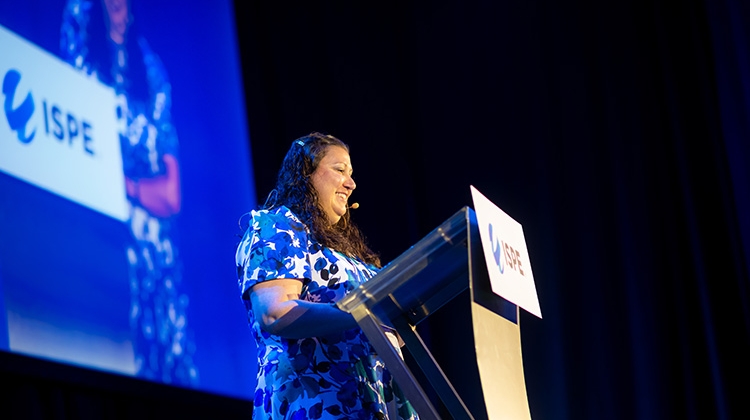ISPE conferences provide unique opportunities for engagement and open dialog with global regulatory agencies. This year, Dr. Jennifer Maguire joined from FDA CDER’s Office of Quality Surveillance (OQS) to provide a keynote presentation on Quality Management Maturity (QMM) and the FDA’s ongoing QMM program development.
Understanding the complexities of drug shortages has increased with the COVID-19 public health emergency, particularly with supply chain vulnerabilities. It has become apparent that complementary approaches are necessary to address supply and demand driven shortages, including the need to innovatively transition from lagging indicators such as Quality Defect reports, inspection data, and application data to leading approaches driven by QMM ratings and appropriate Quality Metrics (QM).
In the 2019 report, Drug Shortages: Root Causes and Potential Solutions, the FDA identified that the market does not recognize and reward manufacturers for “mature quality systems” that focus on continual improvement and early detection of supply chain issues. The FDA’s proposed solution was to develop a QMM rating program intended to incentivize manufactures to invest in culture and to drive continual improvement and innovation. The concept of the QMM program began following early learnings on Quality Metrics.
Dr. Maguire provided an understanding of QMM, whereby “drug manufactures achieve higher levels of maturity when they successfully integrate business and manufacturing operations with quality practices and technological advancements to optimize product quality, enhance supply chain reliability, and drive continual improvement.” QMM practice areas will be assessed according to a defined rubric aligning to the concept that better QMM ratings provide a higher assurance of product availability.
While they may sound similar, Quality Management Maturity should not be confused with Quality Metrics. Quality Metrics are quantitative measurement of product and/or process performance whereas Quality Management Maturity is a more qualitative and holistic measurement of behaviors and systems. Furthermore, any QMM rating program will be voluntary whereas Quality Metrics are considered mandatory under FDA regulations. FDA views Quality Metrics as just one element of Quality Management Maturity. A high QMM rating is intended to recognize performance beyond basic good manufacturing practices (GMPs). It is also important to recognize that a QMM evaluation is different than a GMP surveillance inspection and would be conducted separately.
FDA’s establishment of the QMM program is a long-term initiative being developed in collaboration with extensive feedback and comments from industry and other stakeholders. Recent milestones and publications on the topic include two pilots completed in 2022, the April 2022 Office of Pharmaceutical Quality (OPQ) White Paper, the May 2022 CDER Small Business and Industry Assistance BIA Quality Management Maturity Workshop, the November 2022 FDA Advisory Committee, and additional academic research articles on learnings from the pilots.
Dr. Maguire acknowledged that implementation of a QMM program will not be fast, and that the FDA still has many decisions to make. They are currently working to develop a rubric based on the learnings from the pilots, research results, public feedback, and work by industry associations, such as ISPE’s Advancing Pharmaceutical Quality (APQ) Program. Several key operational decisions prior to launching a QMM program still need to be considered, including who will perform the assessments (i.e., FDA or contractor), will the assessments be onsite or virtual, what is the reassessment period, and importantly what if any information will be made public.
Even though FDA’s rating program is not yet available, pharmaceutical manufacturers can assess elements of their Quality Management Maturity using ISPE’s Advancing Pharmaceutical Quality (APQ) program. This program has been developed by industry representatives, for industry use, to advance the current state of pharmaceutical quality by providing practical tools and approaches to enhance the effectiveness of the Pharmaceutical Quality System (PQS). The APQ program is intended to provide a practical framework that an organization can use to first assess the maturity and then advance the state of quality within their organization. It is a quality management maturity program that aims to identify good practices and good behaviors which support the continual improvement of quality management effectiveness within an organization.
The program is aligned with international initiatives that promote quality excellence, as well as with the FDA’s interest in quality management maturity and rating the maturity of manufacturing facilities, as cited in their 2019 Drug Shortages report. The APQ program recognizes that the ability to advance the maturity of quality management lies within the industry itself and a key driver for this program is to provide a range of sustainable and practical quality management improvement strategies.
The APQ program provides specific guidance on how to assess and improve each element of the Pharmaceutical Quality System as described in ICH Q10 using the APQ Assess, Aspire, Act & Advance Framework. This structured framework provides practical tools, comprising of both quantitative and qualitative assessment criteria, against which the effectiveness of the pharmaceutical quality system can first be evaluated and then improved upon.
The FDA has been very receptive to ISPE input and continues to engage in ongoing dialogue with the APQ program team. The APQ team recently hosted a face-to-face workshop at the ISPE headquarters in North Bethesda, MD, and were joined by Dr. Maguire and OQS members Djamila Harouaka and Alex Viehmann. A range of topics related to QMM was discussed, and members of the APQ team members shared lessons learned, opportunities, and best practices for QMM program adoption. This productive meeting speaks to the open and transparent feedback welcomed by the FDA.
The ISPE Advancing Pharmaceutical Quality Team thanks Dr Maguire and her team and looks forward to continued discussions between the FDA and ISPE on QMM program development.
Learn More about the APQ Program
Disclaimer
This article contains an abridged, unofficial summary of a presentation made at an ISPE conference on 9 May 2023. This content, represents an informal and brief synopsis of the speaker’s views and has not been vetted by any regulatory agency.





